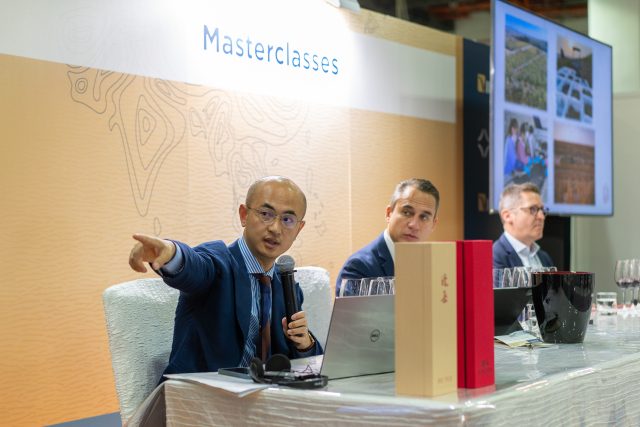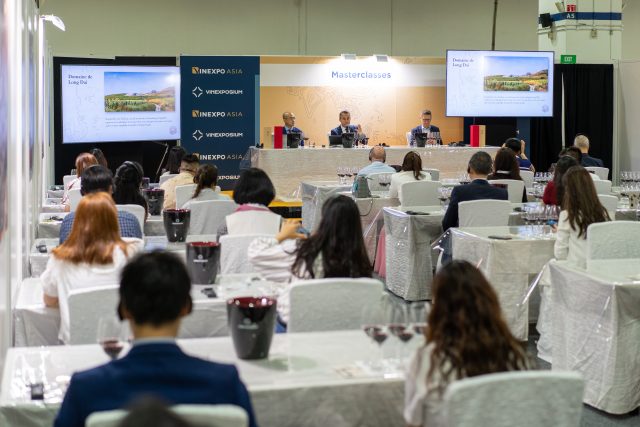This website uses cookies so that we can provide you with the best user experience possible. Cookie information is stored in your browser and performs functions such as recognising you when you return to our website and helping our team to understand which sections of the website you find most interesting and useful.
China’s Domaine de Long Dai holds its first vertical tasting outside China
Domaine de Long Dai introduced its wines to a wider audience in a special masterclass at Vinexpo Asia, Singapore.

The tasting lineup included three recent vintages: the 2018, 2019 and 2020 from the first label Long Dai and the second label, Hu Yue. Notably, it was the first Long Dai vertical tasting outside China.
“Having these three vintages lined up like this is not an everyday thing, even for us,” said Elodie Chabot, Asia Pacific area manager.
Located in northeast China, near the town of Penglai, in the Shandong province, Domaine de Long Dai is the Chinese outpost for Chateau Baron de Rothschild.
The vines were planted in 2011 on 34 hectares spread across 420 diverse terraces in keeping with the region’s agricultural practises. As the grapes do not ripen evenly, harvest is completed in several passes. The soils are largely granitic, and the weather is temperate with milder winters, and unlike other parts of China, the vines do not need to be buried in winter.
The masterclass was hosted by cellar master Liang Chen, general manager of the estate Charles Treutenaere, and global commercial director Guillaume Deglise.

Cellar master Chen, who led the tasting component, set the tone and explained: “One of the main objectives of this tasting was to show the specificity of this new terroir, Qiu Shan Valley, and the difference between vintages.”
China’s signature grape, Marselan, features in both wines. Long Dai wines are a blend of three grapes: Cabernet Sauvignon, Cabernet Franc and Marselan. As for Hu Yue, Cabernet dominates the blend again, with marselan, cabernet franc, syrah and merlot making up the rest.
“Marselan is becoming the symbolic grape for China,” Treutenaere said, “All over China, the expression for marselan is very good.” He added that Cabernet Sauvignon achieves full ripeness levels in Shandong, whereas other regions can struggle to achieve optimal ripeness.
From the Long Dai line-up, 2018 impressed the most, showcasing itself as a product of near-perfect vintage conditions, offering up a finely structured wine offered notes of blackberry, cacao, spice, and dried tobacco.
The 2019 vintage was hot and dry, and the wine delivers riper black cherry and plums, fine grain tannins and peppery spice on the finish. The 2020, on the other hand, benefited from a cool vintage and highlights blackcurrant, liquorice, and floral notes. It is marked with vibrant acidity.
“Being able to share these wines in Singapore with people from all around Asia was a special moment. We got extremely good feedback on the wines, with people mentioning that they have been waiting for a long time to taste the wines of Domaine de Long Dai,” added Chabot.
In previous years, as much as 95 percent of the wine was meant for local consumption, but the numbers have since evolved.
Lafite’s Chinese wine is seeking to expand further into the Southeast Asian markets. Chabot, responsible for the sales in the region, stated that the wines are available on allocation in Hong Kong, Japan, and Singapore- their three key Asian export markets. In addition, the US receives a strict allocation of 100 cases. Long Dai is not yet available in the UK and Europe.
Starting with the 2019 vintage, 70% of the production (approximately 40,000 bottles) is earmarked for the local Chinese market, 10% for exports, and another 20% for cellar door sales and internal stocks.
On expansion beyond Asia, Chabot revealed: “Other markets will follow,” but assured: “We are in the middle of developing Southeast Asia and overall Asian markets”.

